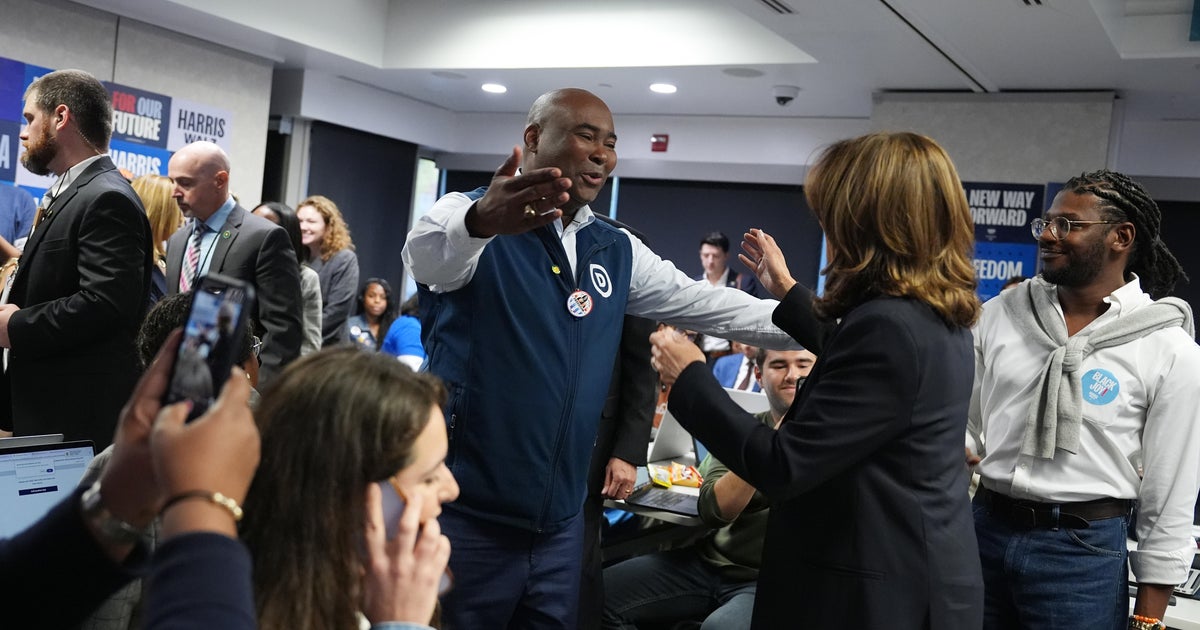Abortion rights backers look to build on success of ballot measures in 2024
Washington — Buoyed by the outcome of ballot measures in six states that put the question of abortion access directly to voters this election cycle, reproductive rights advocates are laying the groundwork to pursue ballot initiatives that would enshrine abortion rights into more state constitutions in 2024.
Proponents of abortion rights are eyeing 10 states where citizens can mount initiatives to amend their state constitutions and where abortion access is currently restricted as possible battlegrounds for ballot measures, though they acknowledge the conditions have to ripe for mounting what is often an expensive, lengthy campaign before voters weigh in at the polls.
"The work that is taking place now is, how do you think strategically about how ballot measures fit into your broader set of priorities alongside litigation, direct care through abortion funds, legislative advocacy and trying to change the balance of power?" said Kelly Hall, executive director of the Fairness Project, a progressive group that helps organize and support ballot measures. She added that they are not "the silver bullet."
In two states, the process to place proposed amendments on the ballot in 2024 is already underway. In Oklahoma, State Question 828, if certified, would add a "right to reproductive freedom" to the state constitution. South Dakota's Right to Abortion Amendment would allow abortions through the first trimester of pregnancy. In the second trimester, the state could regulate abortion only if it "reasonably" relates to the health of the mother.
Activists have also begun examining whether the environment is right to pursue initiatives in Ohio, Missouri and Colorado, according to Sarah Standiford, national campaigns director for Planned Parenthood Action Fund.
"The most important factor is, where can this strategy help protect or provide access to care? And so certainly we're interested in this among other strategies for states where care is at risk or already restricted," she told CBS News. "Everything is on the table as we fight back, and now more than ever, from state courts to state houses to everyday citizens, we all have a role to play. Voters have seen the impact of their actions through legislative and congressional races and ballot-measure voting, and that's the level of empowerment that is going to be required to make a difference in the years ahead."
The Supreme Court's June decision rolling back the constitutional right to abortion changed the landscape for reproductive rights nationwide, as decisions regarding abortion policy were returned to the states.
In the wake of the high court's reversal of Roe v. Wade, 18 states have restricted abortion through gestational limits or enacted outright bans. Abortion rights advocates have mounted an all-hands-on deck effort to protect reproductive rights through the state courts, state legislatures and at the ballot box.
Constitutional amendments, though, offer more durable protections, as they are shielded from partisan shifts within state houses or state courts that now are on hearing legal challenges to abortion restrictions under state constitutions.
"Ballot measures, where they are available, offer citizens a workaround past ideological extremism, gridlock, the failure to govern, and in this instance, the opportunity to say, 'Some rights are so fundamental, they need to be outside the political arena. We want these rights to be durable, to outlast any politicians' tenure. This belongs in our state constitution, this isn't up to you,'" Hall said.
But pursuing a constitutional amendment, including through a citizen-led initiative, requires a bespoke approach based on factors such as voters' attitudes, the composition of state courts and access to care.
"The path to restore, protect or even expand abortion access and equitable access has to run through the states right now, and that's because gerrymandered state legislatures have voted again and again to unravel our rights, which are now hanging by a thread in many places. We did not get here by accident," Standiford said. "The reality is there isn't a magic bullet, but state action is what is required."
For the 2022 midterm elections, abortion was directly on the ballot in California, Kansas, Kentucky, Michigan, Montana and Vermont. In California, Michigan and Vermont, voters approved state constitutional amendments protecting abortion rights.
In traditionally conservative Kansas, Kentucky and Montana, voters rejected proposals to restrict abortion access, delivering crucial victories to abortion rights backers who worked to defeat the measures.
"Those outcomes are further proof of what we already know to be true, which is an overwhelming amount of people want to protect reproductive freedom in this country," Carolyn Ehrlich, senior political strategist with the ACLU, told CBS News. "We continue to see a lot of promise in appealing directly to voters who are so clearly with us on the issues as a roadmap for protecting abortion where the legislature may be a roadblock to progress."
In the aftermath of the Supreme Court's decision ending the constitutional right to an abortion, many Democratic candidates made the issue a centerpiece of their campaigns in hopes the threat to abortion access would be a motivator for voters.
The focus on abortion appeared to galvanize Democratic voters, as the party staved off the predicted "red wave" — Republicans won a slimmer majority in the House than expected — and maintained its control of the Senate. Voters in Michigan and Pennsylvania ranked abortion access as their top concern.
The outcomes proved that the backlash in response to the Supreme Court's decision would carry through the midterm elections and lift Democrats, though it's remains be seen whether abortion will continue to be a motivator in 2024.
But Hall, of the Fairness Project, said she expects the momentum will continue to build in favor of abortion rights as the effects of state restrictions are felt across the coming years.
"I don't think what is animating voters on the issue of abortion are candidate campaign cycles or media news cycles. It is the actual obliteration of choice and reproductive freedom rights in 18 states where abortion has been banned, where people are already facing medical risks, economic devastation and trying to find ways across state lines to get the care they need," she said. "The problem is only going to compound over time. The more that people in states like Oklahoma, Missouri, Arkansas, across the South are facing the reality of what this means month after month after month, that momentum is not going to wane."




